Linux下如何使用C++获取硬件信息
作者:ACE叫牌
方法
通过读取Linux下存放硬件信息的文件来获取CPU、主板、磁盘、BIOS信息
获取CPU信息:读取"/proc/cpuinfo"文件
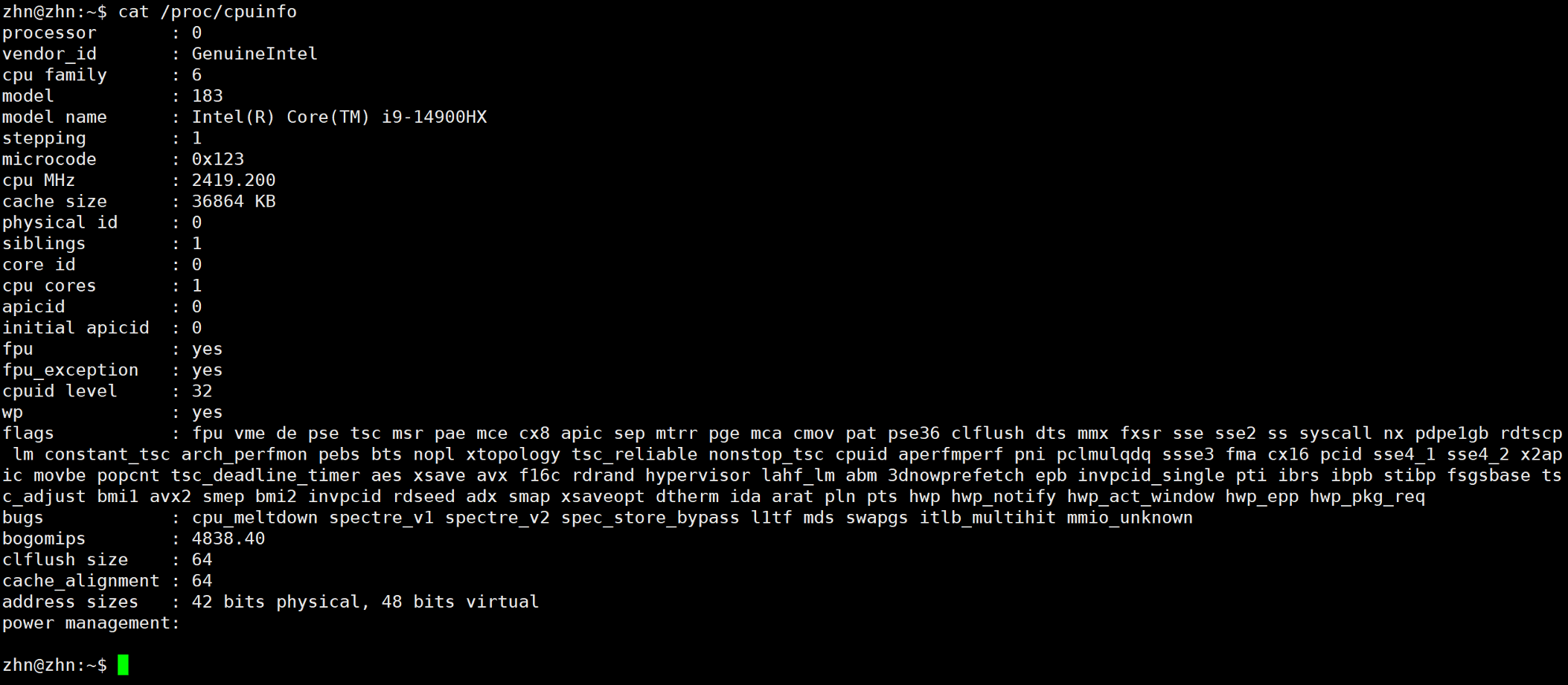
字段及其含义:
处理器基本信息:
- processor:处理器的逻辑编号,从 0 开始,用于标识系统中的每个逻辑 CPU。
- vendor_id:CPU制造商的标识符。例如,对于 Intel CPU,可能是GenuineIntel;对于 AMD CPU,可能是AuthenticAMD。
处理器型号与家族信息
- cpu family:CPU 所属的家族编号。不同家族的 CPU 可能具有不同的架构和特性。例如,Intel 的酷睿系列和至强系列可能属于不同的家族。
- model:CPU型号编号,结合cpu family可以更准确地确定 CPU 的具体型号。
- model name:CPU 的完整型号名称,提供了详细的 CPU 型号描述,如Intel® Core™ i7-10700K CPU @ 3.80GHz。
步进与微代码信息:
- stepping:CPU的步进编号,它标识了 CPU 的修订版本。不同的步进可能包含对之前版本的错误修复或性能改进。
- microcode:CPU微代码版本号,微代码是嵌入在 CPU 中的一小段代码,用于协助 CPU 执行指令,可以通过更新微代码来修复 CPU 的一些问题或提升性能。
性能相关信息:
cpu MHz:CPU当前的运行频率,单位为 MHz。这可能是动态变化的,尤其是在支持节能技术(如 Intel 的 SpeedStep 或 AMD 的
- Cool’n’Quiet)的 CPU 上。
- cache size:CPU 缓存的大小,通常以 KB 或 MB 为单位。缓存可以提高 CPU 访问数据的速度,较大的缓存通常意味着更好的性能。
多处理器与多核信息:
- physical id:物理处理器的标识符。在多处理器系统中,每个物理 CPU 有一个唯一的physical id。
- siblings:同一物理 CPU上的逻辑处理器数量,即超线程技术下每个物理核心对应的逻辑核心数。例如,如果一个物理核心支持超线程,siblings可能为 2。
- core id:每个物理核心的唯一标识符,在同一物理 CPU 内,不同的物理核心有不同的core id。
- cpu cores:每个物理 CPU 中的核心数量,不包括超线程产生的逻辑核心。
其他信息:
- apicid:高级可编程中断控制器(APIC)标识符,用于多处理器系统中的中断处理。
- flags:CPU支持的特性标志列表,每个标志表示 CPU 支持的一种特定功能或指令集,如mmx、sse、sse2等,这些指令集可以加速特定类型的计算任务。
- bogomips:代表 “BogusMIPS(伪每秒百万条指令数)”。它是一种对 CPU 性能的近似估计值,并非基于实际指令执行的精确测量。这个数值最初由 Linus Torvalds引入 Linux 内核,作为一种快速且相对简单的方法来评估 CPU 的处理能力。
- clflush size:缓存行刷新(Cache Line Flush)操作所涉及的缓存行大小。
获取磁盘信息:读取"/proc/diskstats"文件
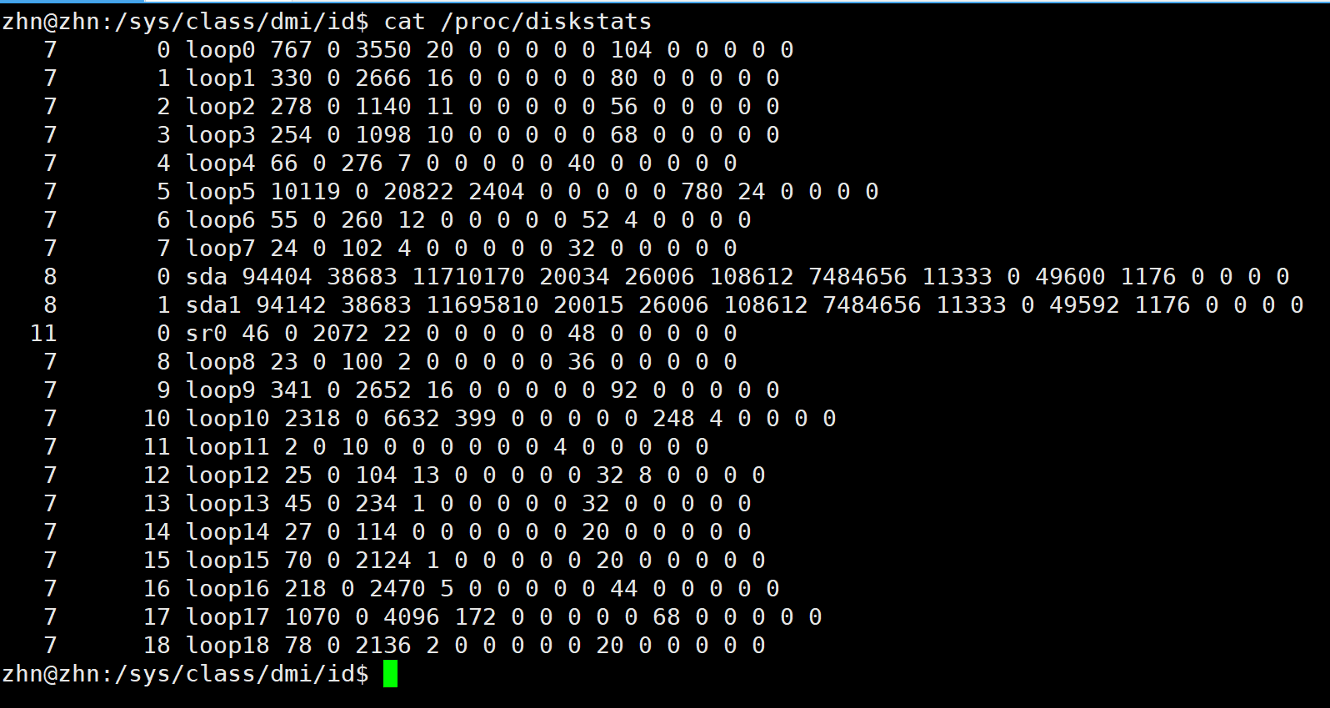
字段及其含义(从左至右):
- 主设备号(Major device number):在示例中为8,它标识设备类型。例如,8通常代表SCSI 磁盘设备。不同的设备类型有不同的主设备号,可用于识别设备所属的大类。
- 次设备号(Minor device number):示例中的0,它用于在同一主设备类型下进一步区分具体的设备实例。主设备号和次设备号共同唯一标识系统中的一个块设备。
- 设备名称(Device name):这里是sda,这是设备在系统中的名称,通常对应/dev目录下的设备文件名,方便用户和系统管理员识别和操作具体设备。
- 读完成次数(Reads completed successfully):212553,表示从设备成功完成的读操作次数。每次成功读取数据块,该计数增加。
- 读合并次数(Reads merged):14992,系统有时会合并相邻的读请求以提高 I/O 效率,该字段统计了合并读操作的次数。合并读可以减少I/O 操作的总次数,提升性能。
- 读扇区数(Sectors read):1469963,表示从设备读取的扇区总数。一个扇区通常是 512 字节(在现代设备中也可能是 4096字节等),这个数字反映了读取的数据量(以扇区为单位)。
- 读操作花费的毫秒数(Time spent reading (ms)):334512,累计花费在读操作上的时间,以毫秒为单位。它反映了设备读取数据所花费的总时间,可用于评估读性能。
- 写完成次数(Writes completed successfully):1005650,表示向设备成功完成的写操作次数。每次成功写入数据块,该计数增加。
- 写合并次数(Writes merged):121259,类似于读合并,系统会合并相邻的写请求,该字段统计了合并写操作的次数,以提高写性能。
- 写扇区数(Sectors written):6743707,表示向设备写入的扇区总数,反映了写入的数据量(以扇区为单位)。
- 写操作花费的毫秒数(Time spent writing (ms)):10052256,累计花费在写操作上的时间,以毫秒为单位,可用于评估写性能。
- 当前I/O 操作数(I/O requests currently in progress):0,表示当前正在进行的 I/O请求数量。如果这个值持续不为零,可能表示设备出现了 I/O 瓶颈。
- I/O操作花费的总毫秒数(Time spent doing I/O (ms)):343049,累计花费在所有 I/O操作(读和写)上的时间,以毫秒为单位。
- 加权的I/O 操作花费的毫秒数(Weighted time spent doing I/O (ms)):10386768,这是一个加权时间,考虑了I/O 请求的排队时间等因素,能更全面地反映 I/O 操作对系统资源的占用情况。
获取BIOS信息有两种方法
1.读取文件
可以通过读取三个文件分别获得BIOS供应商名称、BIOS版本号、BIOS发布日期,分别是:
BIOS供应商名称:/sys/class/dmi/id/bios_vendor
BIOS版本号:/sys/class/dmi/id/bios_version
BIOS发布日期:/sys/class/dmi/id/bios_date
优点:
无需 root 权限:普通用户即可访问。无额外依赖:直接通过文件接口读取,避免调用外部命令。适用于容器/虚拟化环境:即使 DMI 信息被限制,部分字段仍可能可用。
缺点:获取到的信息少。
2.使用dmidecode命令
工作方式:dmidecode的工作方式就是解析DMI表
命令:sudo dmidecode -t bios
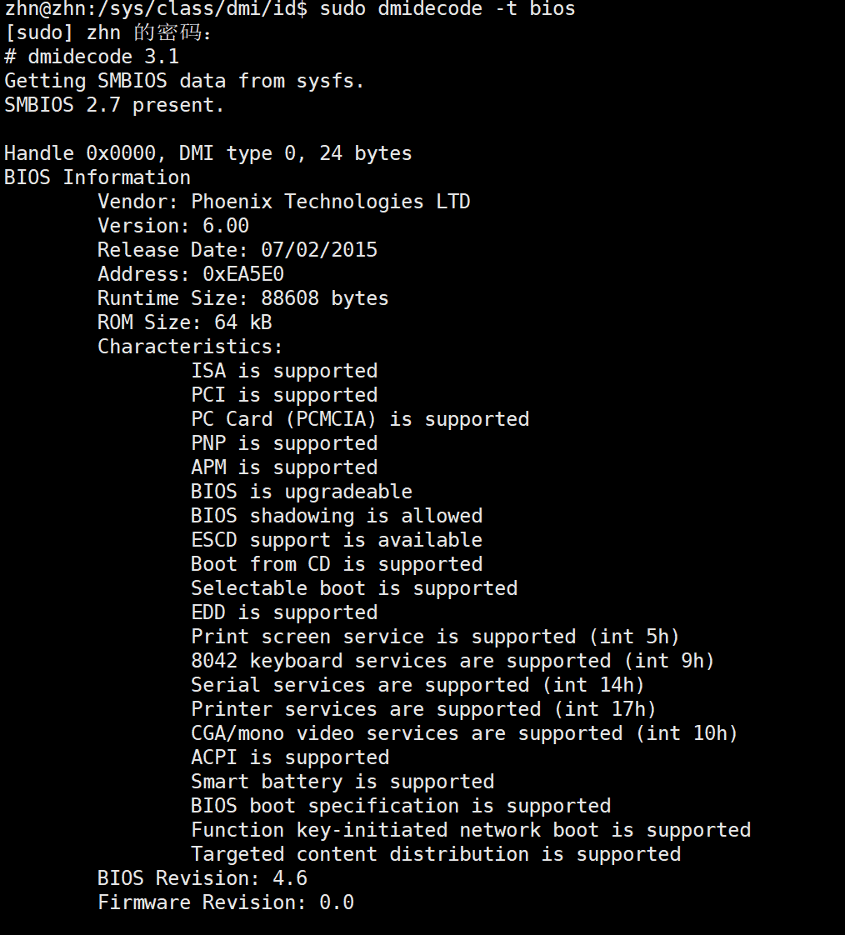
字段含义:
- Vendor:BIOS供应商名称
- Version:BIOS版本号
- Release Date:BIOS发布日期
- Address:BIOS在内存中的物理地址(十六进制)
- Runtime Size:BIOS运行时占用的内存大小
- ROM Size:存储 BIOS固件的 ROM(只读存储器)容量
- Characteristics:BIOS支持的特性列表,每个特性对应一个硬件或软件功能
- BIOS Revision:BIOS 的修订版本号(可能与 Version 不同)
- Firmware Revision:主板固件的版本号(可能与 BIOS 版本分离)
优点: 获取的信息更多、更全面。
缺点:
- 权限要求:dmidecode 需要 root 权限 才能读取完整 DMI表,如果运行程序的用户不是root用户会失败。
- 依赖性:dmidecode方法需要安装该工具(通常默认已安装),常见的安装目录。有"/usr/sbin/dmidecode"、“/sbin/dmidecode”、“/usr/local/sbin/dmidecode”。代码在调用命令前需要先验证是否存在路径。
- 适用性:虚拟化环境(如容器)中可能无法提供完整的DMI信息。
获取主板信息有两种方法
1.读取文件
可以通过读取文件分别获得主板供应商名称、主板版本号、主板型号,主板序列号,主板资产标签分别是:
主板供应商名称:/sys/class/dmi/id/board_vendor
主板版本号:/sys/class/dmi/id/board_version
主板型号:/sys/class/dmi/id/board_name
主板序列号:/sys/class/dmi/id/board_serial,读取该文件需要root权限,所以代码中无法依靠读取文件获取,但是可以通过dmidecode命令获取(见下文)
主板资产标签:/sys/class/dmi/id/board_asset_tag
优点:
无需 root 权限:普通用户即可访问。无额外依赖:直接通过文件接口读取,避免调用外部命令。适用于容器/虚拟化环境:即使 DMI 信息被限制,部分字段仍可能可用。
缺点: 获取到的信息少。
2.使用dmidecode命令
工作方式:dmidecode的工作方式就是解析DMI表
命令:sudo dmidecode -t baseboard
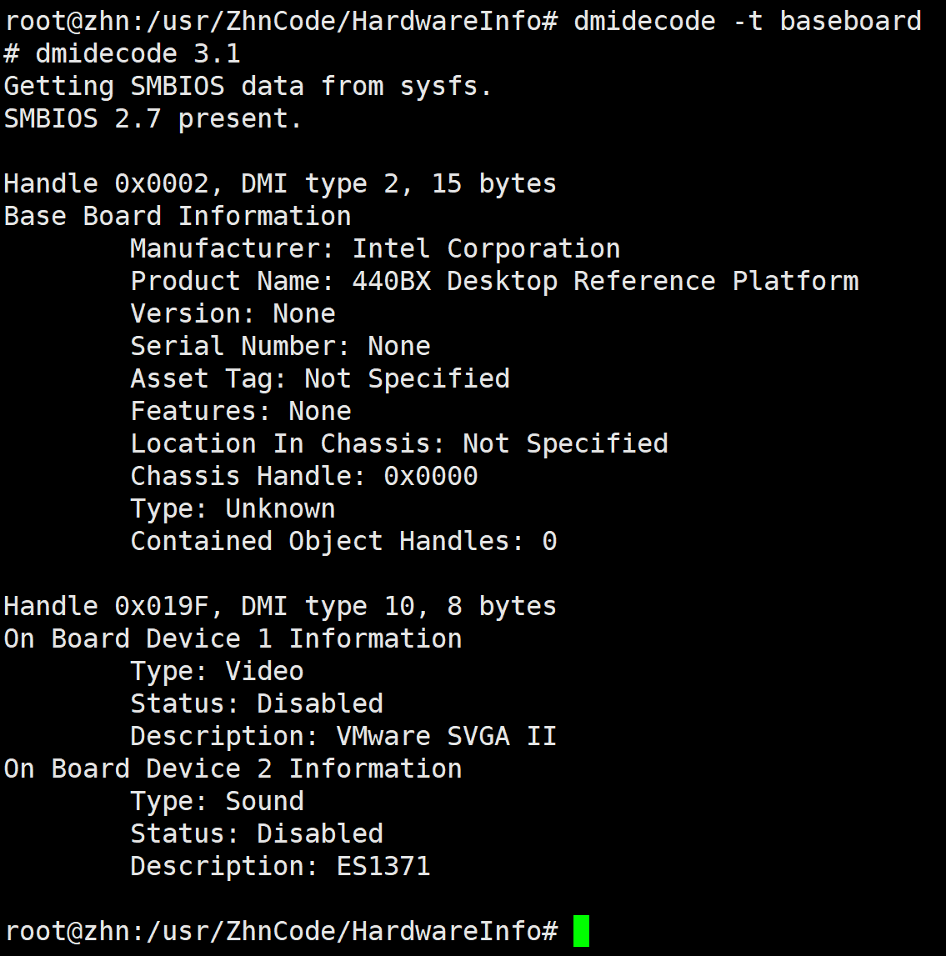
字段含义:
- Manufacturer:主板制造商
- Product Name: 主板型号
- Version:主板版本号,None为未指定
- Serial Number:主板序列号,None为未指定
- Asset Tag: 资产标签,Not Specified为未指定
- Features:主板特殊功能,None为无特殊功能
- Location In Chassis:主板在机箱中的位置,Not Specified未记录
- Chassis Handle:关联的机箱记录句柄,0x0000为未关联或默认值
- Type:主板类型,Unknown为未明确
- Contained Object Handle:关联的子设备,0表示无关联
优点: 获取的信息更多、更全面。
缺点:
- 权限要求:dmidecode 需要 root 权限 才能读取完整 DMI表,如果运行程序的用户不是root用户会失败。
- 依赖性:dmidecode方法需要安装该工具(通常默认已安装),常见的安装目录。有"/usr/sbin/dmidecode"、“/sbin/dmidecode”、“/usr/local/sbin/dmidecode”。代码在调用命令前需要先验证是否存在路径。
- 适用性:虚拟化环境(如容器)中可能无法提供完整的DMI信息。
代码部分
LinuxHardwareInfo.h
#pragma once
#include <iostream>
#include <fstream>
#include <string>
#include <vector>
#include <string.h>
#include <sstream>
#include <memory>
#include <stdexcept>
#include <array>
#include <sys/types.h>
#include <unistd.h>
#include <stdio.h>
#include <unordered_map>
#include <functional>
// CPU信息结构体
struct CPUInfo
{
std::string processor_; // CPU 的逻辑编号
std::string vendor_id_; // CPU 制造商的标识符
std::string cpu_family_; // CPU 所属的家族编号
std::string model_; // CPU 型号编号
std::string model_name_; // CPU 的完整型号名称
std::string stepping_; // CPU 的步进编号
std::string microcode_; // CPU 微代码版本号
std::string cpu_freq_; // CPU 当前的运行频率,单位为 MHz
std::string cache_size_; // CPU 缓存的大小,单位为KB
std::string physical_id_; // CPU 的标识符
std::string siblings_; // 同一物理 CPU 上的逻辑处理器数量
std::string core_id_; // 每个物理核心的唯一标识符
std::string cpu_cores_; // 每个物理 CPU 中的核心数量,不包括超线程产生的逻辑核心
std::string clflush_size_; // 缓存行刷新(Cache Line Flush)操作所涉及的缓存行大小
};
// 磁盘信息结构体
struct DiskStatsInfo
{
std::string major_device_num_; // 主设备号,标识设备类型
std::string minor_device_num_; // 次设备号,用于在同一主设备类型下进一步区分具体的设备实例,主设备号和次设备号共同唯一标识系统中的一个块设备
std::string device_name_; // 磁盘名称,对应/dev目录下的设备文件名
std::string read_completed_; // 从设备成功完成的读操作次数,每次成功读取数据块,该计数增加
std::string read_merged_; // 合并读操作次数
std::string read_sectors_; // 从设备读取的扇区总数
std::string read_time_spent_; // 累计花费在读操作上的时间,单位毫秒
std::string write_completed_; // 向设备成功完成的写操作次数,每次成功写入数据块,该计数增加
std::string write_merged_; // 合并写操作次数
std::string write_sectors_; // 向设备写入的扇区总数
std::string write_time_spent_; // 累计花费在写操作上的时间,单位毫秒
};
// BIOS信息结构体,细节信息通过dmidecode命令获取到的
struct BIOSMoreInfo
{
// 基础信息
std::string vendor_; // BIOS供应商
std::string version_; // BIOS版本
std::string date_; // BIOS发布日期
// 细节信息
std::string address_; // BIOS 在内存中的物理地址(十六进制)
std::string runtime_size_; // BIOS运行时占用的内存大小,单位为bytes
std::string rom_size_; // 存储 BIOS 固件的 ROM(只读存储器)容量,单位为kB
std::string bios_revision_; // BIOS的修订版本号,可能与Version不同
std::string firmware_revisioin_; // 主板固件版本号
};
// 主板信息结构体,细节信息通过dmidecode命令获取
struct BaseboardMoreInfo
{
// 基础信息
std::string vendor_; // 主板供应商
std::string version_; // 主板版本号
std::string name_; // 主板型号
std::string asset_tag_; // 主板资产标签
// 细节信息
std::string serial_num_; // 主板序列号
std::string location_in_chassis_; // 主板在机箱中的位置
std::string type_; // 主板类型
};
// 检测当前运行环境是否可以使用dmidecode命令
#ifndef IsUseDmidecodeCommand
#define IsUseDmidecodeCommand()\
bool is_use_dmidecode = false;\
\
if(geteuid() == 0 && FindDmidecodePath())\
is_use_dmidecode = true;\
else\
std::cout << "当前运行环境不支持dmidecode命令, 只获取基本信息" << std::endl;
#endif
// 根据:进行字符串切割并去除两端空格得到key和value字符串
#ifndef SplitRemoveWhite
#define SplitRemoveWhite(_line)\
size_t pos = _line.find(':');\
\
if (pos == std::string::npos)\
return;\
\
std::string key = _line.substr(0, pos);\
std::string value = _line.substr(pos + 1);\
\
RemoveWhiteSpace(value);\
RemoveWhiteSpace(key);
#endif
// Linux下获取CPU的所有信息
class LinuxHardwareInfo
{
public:
LinuxHardwareInfo();
~LinuxHardwareInfo();
/*
@brief 获取CPU的所有信息
@param _cpu_infos 会有多个cpu的信息
*/
void GetProcessorAllInfo(std::vector<CPUInfo>& _cpu_infos);
/*
@brief 获取磁盘的所有信息
@param _disk_infos 会有多个磁盘信息
*/
void GetDiskStatsAllInfo(std::vector<DiskStatsInfo>& _disk_infos);
/*
@brief 获取BIOS的信息
1、该接口会先使用demidecode命令获取BIOS更详细的信息,如果检测到系统的demidecode命令无法使用,改用读取文件的方式只获取BISO
基本信息!!!
2、该接口返回true的情况为:Linux系统已经安装demidecode命令,并且运行程序的用户为root用户
@param _bios_info BIOS信息结构体
@return true表示demidecode命令可以使用,获取到了更详细的信息;false说明当前运行环境的demidecode命令无法使用,只能获取基本信息。
*/
bool GetBIOSAllInfo(BIOSMoreInfo& _bios_info);
/*
@brief 获取主板的信息
1、该接口会先使用demidecode命令获取BIOS更详细的信息,如果检测到系统的demidecode命令无法使用,改用读取文件的方式只获取主板
基本信息!!!
2、该接口返回true的情况为:Linux系统已经安装demidecode命令,并且运行程序的用户为root用户
@param _board_info 主板信息结构体
@return true表示demidecode命令可以使用,获取到了更详细的信息;false说明当前运行环境的demidecode命令无法使用,只能获取基本信息。
*/
bool GetBoardAllInfo(BaseboardMoreInfo& _board_info);
private:
/*
@brief 通过读取文件的方式获取BIOS基本信息
@param BIOS基本信息
*/
void GetBIOSBasicInfo(BIOSMoreInfo& _bios_info);
/*
@brief 通过读取文件的方式获取主板基本信息
@param 主板基本信息
*/
void GetBoardBasicInfo(BaseboardMoreInfo& _board_info);
/*
@brief 去除字符串两端的空白字符,包括空格、\t等
@param _str 源字符串
*/
void RemoveWhiteSpace(std::string& _str);
/*
@brief 解析CPU文件信息的一行
@param _line 一行字符串
@param _cpu_info 存储数据的结构体
*/
void ParseProcessorLine(const std::string& _line, CPUInfo& _cpu_info);
/*
@brief 处理BISO信息的一行
@param _line 一行字符串
@param _bios_info BISO数据结构体
*/
void ProcessBIOSLine(const std::string& _line, BIOSMoreInfo& _bios_info);
/*
@brief 处理主板信息的一行
@param _line 一行字符串
@param _board_info 主板数据结构体
*/
void ProcessBoardLine(const std::string& _line, BaseboardMoreInfo& _board_info);
/*
@brief 检查 dmidecode 是否存在并返回其完整路径
@return true表示存在,false表示不存在
*/
bool FindDmidecodePath();
/*
@brief 执行命令并捕获输出
@param cmd 命令
@return 输出的字符串
*/
std::string GetStrByCommand(const char* _cmd);
/*
@brief 按照换行符进行切割
@param _str 源字符串
@return 切割后的集合
*/
std::vector<std::string> SplitByNewline(const std::string& _str);
/*
@brief 更新主板结构体处理器
@param _key 结构体成员对应的key值
@param value 结构体成员值
*/
void UpdateBoardInfo(BaseboardMoreInfo& _board_info, const std::string& _key, const std::string& _value);
/*
@brief 更新BIOS结构体处理器
@param _key 结构体成员对应的key值
@param value 结构体成员值
*/
void UpdateBIOSInfo(BIOSMoreInfo& _bios_info, const std::string& _key, const std::string& _value);
/*
@brief 更新CPU结构体处理器
@param _key 结构体成员对应的key值
@param value 结构体成员值
*/
void UpdateCpuInfo(CPUInfo& _cpu_info, const std::string& _key, const std::string& _value);
private:
// 成员指针类型别名
using BoardMemberPtr = std::string BaseboardMoreInfo::*;
using BIOSMemberPtr = std::string BIOSMoreInfo::*;
using CpuMemberPtr = std::string CPUInfo::*;
const std::string cpu_file_; // Linux系统下cpu信息的存储路径
const std::string disk_file_; // Linux系统下磁盘信息的存储路径
const std::string bios_dir_; // Linux系统下存放BIOS信息的目录
const std::vector<std::string> bios_files_name_; // Linux系统下存放BIOS信息的所有文件名
const std::string board_dir_; // Linux系统下存放主板信息的目录
const std::vector<std::string> board_files_name_; // Linux系统下存放主板信息的所有文件名
const std::vector<std::string> dmidecode_command_path_; // Linux系统下常见的demidecode命令的完整路径,检测系统是否安装该命令会用到
std::unordered_map<std::string, std::function<void(std::string)>> process_board_value_map_; // 给主板信息结构体赋值
};
LinuxHardwareInfo.cpp
#include "LinuxHardwareInfo.h"
LinuxHardwareInfo::LinuxHardwareInfo()
: cpu_file_("/proc/cpuinfo")
, disk_file_("/proc/diskstats")
, bios_dir_("/sys/class/dmi/id/")
, bios_files_name_({"bios_vendor","bios_version","bios_date"})
, dmidecode_command_path_({"/usr/sbin/dmidecode", "/sbin/dmidecode", "/usr/local/sbin/dmidecode"})
, board_dir_("/sys/class/dmi/id/")
, board_files_name_({"board_vendor","board_version","board_name","board_asset_tag"})
{
}
LinuxHardwareInfo::~LinuxHardwareInfo()
{
}
void LinuxHardwareInfo::GetProcessorAllInfo(std::vector<CPUInfo> &_cpu_info)
{
std::ifstream file(cpu_file_);
if (!file.is_open())
{
std::cerr << "CPU文件: " << cpu_file_ << "打开失败" << std::endl;
return;
}
CPUInfo cpuInfo;
std::string line;
while (std::getline(file, line))
{
if (line.empty())
{
// 读取下一个cpu的信息
if(!cpuInfo.model_name_.empty())
{
_cpu_info.push_back(cpuInfo);
cpuInfo = CPUInfo();
}
}
else
ParseProcessorLine(line, cpuInfo);
}
// 添加最后一个CPU信息
if (!cpuInfo.model_name_.empty())
{
_cpu_info.push_back(cpuInfo);
}
file.close();
}
void LinuxHardwareInfo::GetDiskStatsAllInfo(std::vector<DiskStatsInfo> &_disk_infos)
{
std::ifstream disk_stats_file(disk_file_);
if (!disk_stats_file.is_open())
{
std::cerr << "磁盘文件: " << disk_file_ << "打开失败" << std::endl;
return;
}
std::string line;
while (std::getline(disk_stats_file, line))
{
std::istringstream iss(line);
DiskStatsInfo diskStats;
std::string inFlight, ioTicks, timeInQueue;
if (!(iss >> diskStats.major_device_num_ >> diskStats.minor_device_num_ >> diskStats.device_name_
>> diskStats.read_completed_ >> diskStats.read_merged_ >> diskStats.read_sectors_
>> diskStats.read_time_spent_ >> diskStats.write_completed_
>> diskStats.write_merged_ >> diskStats.write_sectors_ >> diskStats.write_time_spent_
>> inFlight >> ioTicks >> timeInQueue))
{
continue;
}
_disk_infos.push_back(diskStats);
}
disk_stats_file.close();
return;
}
bool LinuxHardwareInfo::GetBIOSAllInfo(BIOSMoreInfo &_bios_info)
{
IsUseDmidecodeCommand()
if(is_use_dmidecode) // 使用dmidecode命令获取更详细的BISO信息
{
try
{
// 对获取到的命令输出进行字符串切割
std::vector<std::string> bios_info_vec = SplitByNewline(GetStrByCommand("dmidecode -t bios"));
for(const auto& line : bios_info_vec)
{
ProcessBIOSLine(line, _bios_info);
}
} catch (const std::exception& e)
{
std::cerr << "dmidecode命令执行错误: " << e.what() << std::endl;
// 抛出异常后只获取基本信息
GetBIOSBasicInfo(_bios_info);
return false;
}
}
else // 只获取基本信息
GetBIOSBasicInfo(_bios_info);
return is_use_dmidecode;
}
bool LinuxHardwareInfo::GetBoardAllInfo(BaseboardMoreInfo &_board_info)
{
IsUseDmidecodeCommand()
if(is_use_dmidecode) // 使用dmidecode命令获取更详细的主板信息
{
try
{
// 对获取到的命令输出进行字符串切割
std::vector<std::string> board_info_vec = SplitByNewline(GetStrByCommand("dmidecode -t baseboard"));
bool is_parse = false;
for(const auto& line : board_info_vec)
{
if(line == "Base Board Information")
is_parse = true;
else if(line.empty())
is_parse = false;
if(is_parse)
ProcessBoardLine(line, _board_info);
}
} catch (const std::exception& e)
{
std::cerr << "dmidecode命令执行错误: " << e.what() << std::endl;
// 抛出异常后只获取基本信息
GetBoardBasicInfo(_board_info);
return false;
}
}
else // 只获取基本信息
GetBoardBasicInfo(_board_info);
return is_use_dmidecode;
}
void LinuxHardwareInfo::GetBIOSBasicInfo(BIOSMoreInfo &_bios_info)
{
for(const auto& file_name : bios_files_name_)
{
// bios文件路径
std::string path = bios_dir_ + file_name;
std::ifstream file(path);
if (!file.is_open())
{
std::cerr << "BIOS文件: " << path << "打开失败" << std::endl;
return;
}
std::string value;
std::getline(file, value);
UpdateBIOSInfo(_bios_info,file_name,value);
}
}
void LinuxHardwareInfo::GetBoardBasicInfo(BaseboardMoreInfo &_board_info)
{
for(const auto& file_name : board_files_name_)
{
// board文件路径
std::string path = board_dir_ + file_name;
std::ifstream file(path);
if (!file.is_open())
{
std::cerr << "主板文件: " << path << "打开失败" << std::endl;
return;
}
std::string value;
std::getline(file, value);
UpdateBoardInfo(_board_info,file_name,value);
}
}
void LinuxHardwareInfo::RemoveWhiteSpace(std::string &_str)
{
int head_idx = 0, tail_idx = _str.length() - 1;
bool head_flag = false, tail_flag = false;
while (head_idx != tail_idx)
{
// 使用std::isspace方法判断空白字符,因为会有\t等情况
if(!head_flag && std::isspace(_str[head_idx]))
head_idx++;
else
head_flag = true;
if(!tail_flag && std::isspace(_str[tail_idx]))
tail_idx--;
else
tail_flag = true;
if(head_flag && tail_flag)
break;
}
_str = _str.substr(head_idx, tail_idx - head_idx + 1);
return;
}
void LinuxHardwareInfo::ParseProcessorLine(const std::string &_line, CPUInfo &_cpu_info)
{
SplitRemoveWhite(_line)
UpdateCpuInfo(_cpu_info,key,value);
}
void LinuxHardwareInfo::ProcessBIOSLine(const std::string &_line, BIOSMoreInfo &_bios_info)
{
SplitRemoveWhite(_line)
UpdateBIOSInfo(_bios_info,key,value);
}
void LinuxHardwareInfo::ProcessBoardLine(const std::string &_line, BaseboardMoreInfo &_board_info)
{
SplitRemoveWhite(_line)
UpdateBoardInfo(_board_info,key,value);
}
bool LinuxHardwareInfo::FindDmidecodePath()
{
for (const auto& path : dmidecode_command_path_)
{
if (access(path.c_str(), X_OK) == 0)
{
return true; // 找到有效路径
}
}
return false;
}
std::string LinuxHardwareInfo::GetStrByCommand(const char *_cmd)
{
std::array<char, 128> buffer;
std::string result;
std::unique_ptr<FILE, decltype(&pclose)> pipe(popen(_cmd, "r"), pclose);
if (!pipe)
{
throw std::runtime_error("Failed to execute command");
}
while (fgets(buffer.data(), buffer.size(), pipe.get()) != nullptr)
{
result += buffer.data();
}
return result;
}
std::vector<std::string> LinuxHardwareInfo::SplitByNewline(const std::string &_str)
{
std::vector<std::string> lines;
std::istringstream iss(_str);
std::string line;
while (std::getline(iss, line, '\n'))
{
lines.push_back(line);
}
return lines;
}
void LinuxHardwareInfo::UpdateBoardInfo(BaseboardMoreInfo &_board_info, const std::string &_key, const std::string &_value)
{
static const std::unordered_map<std::string, BoardMemberPtr> keys_map = {
{"Manufacturer", &BaseboardMoreInfo::vendor_},
{"Product Name", &BaseboardMoreInfo::name_},
{"Version", &BaseboardMoreInfo::version_},
{"Serial Number", &BaseboardMoreInfo::serial_num_},
{"Asset Tag", &BaseboardMoreInfo::asset_tag_},
{"Location In Chassis", &BaseboardMoreInfo::location_in_chassis_},
{"Type", &BaseboardMoreInfo::type_},
{"board_vendor", &BaseboardMoreInfo::vendor_},
{"board_name", &BaseboardMoreInfo::name_},
{"board_version", &BaseboardMoreInfo::version_},
{"board_asset_tag", &BaseboardMoreInfo::asset_tag_},
{"board_serial", &BaseboardMoreInfo::serial_num_}
};
if (auto it = keys_map.find(_key); it != keys_map.end())
{
_board_info.*(it->second) = _value;
}
// else
// std::cerr << "解析出" << _key << "和" << _value << std::endl;
}
void LinuxHardwareInfo::UpdateBIOSInfo(BIOSMoreInfo &_bios_info, const std::string &_key, const std::string &_value)
{
static const std::unordered_map<std::string, BIOSMemberPtr> keys_map = {
{"Vendor", &BIOSMoreInfo::vendor_},
{"Release Date", &BIOSMoreInfo::date_},
{"Version", &BIOSMoreInfo::version_},
{"Address", &BIOSMoreInfo::address_},
{"Runtime Size", &BIOSMoreInfo::runtime_size_},
{"ROM Size", &BIOSMoreInfo::rom_size_},
{"BIOS Revision", &BIOSMoreInfo::bios_revision_},
{"Firmware Revision", &BIOSMoreInfo::firmware_revisioin_},
{"bios_vendor", &BIOSMoreInfo::vendor_},
{"bios_date", &BIOSMoreInfo::date_},
{"bios_version", &BIOSMoreInfo::version_}
};
if (auto it = keys_map.find(_key); it != keys_map.end())
{
// 部分字段带有单位,去除单位
if(_value.find(" ") != std::string::npos)
{
size_t pos = _value.find(" ");
_bios_info.*(it->second) = _value.substr(0, pos);
}
else
_bios_info.*(it->second) = _value;
}
// else
// std::cerr << "解析出" << _key << "和" << _value << std::endl;
}
void LinuxHardwareInfo::UpdateCpuInfo(CPUInfo& _cpu_info, const std::string &_key, const std::string &_value)
{
static const std::unordered_map<std::string, CpuMemberPtr> keys_map = {
{"processor", &CPUInfo::processor_},
{"vendor_id", &CPUInfo::vendor_id_},
{"cpu family", &CPUInfo::cpu_family_},
{"model", &CPUInfo::model_},
{"model name", &CPUInfo::model_name_},
{"stepping", &CPUInfo::stepping_},
{"microcode", &CPUInfo::microcode_},
{"cpu MHz", &CPUInfo::cpu_freq_},
{"physical id", &CPUInfo::physical_id_},
{"siblings", &CPUInfo::siblings_},
{"core id", &CPUInfo::core_id_},
{"cpu cores", &CPUInfo::cpu_cores_},
{"clflush size", &CPUInfo::clflush_size_}
};
if (auto it = keys_map.find(_key); it != keys_map.end())
{
// 部分字段带有单位,去除单位
if(_value.find(" ") != std::string::npos)
{
size_t pos = _value.find(" ");
_cpu_info.*(it->second) = _value.substr(0, pos);
}
else
_cpu_info.*(it->second) = _value;
}
// else
// std::cerr << "解析出" << _key << "和" << _value << std::endl;
}
main.cpp
#include <iostream>
#include "LinuxHardwareInfo.h"
int main()
{
LinuxHardwareInfo info;
std::cout << "*************************CPU信息*************************" << std::endl;
std::vector<CPUInfo> cpuInfos;
info.GetProcessorAllInfo(cpuInfos);
for (const auto& cpuInfo : cpuInfos)
{
std::cout << "-------------------------" << std::endl;
std::cout << "processor: " << cpuInfo.processor_ << std::endl;
std::cout << "Vendor ID: " << cpuInfo.vendor_id_ << std::endl;
std::cout << "CPU Family: " << cpuInfo.cpu_family_ << std::endl;
std::cout << "Model: " << cpuInfo.model_ << std::endl;
std::cout << "Model Name: " << cpuInfo.model_name_ << std::endl;
std::cout << "Stepping: " << cpuInfo.stepping_ << std::endl;
std::cout << "Microcode: " << cpuInfo.microcode_ << std::endl;
std::cout << "CPU MHz: " << cpuInfo.cpu_freq_ << std::endl;
std::cout << "Cache Size: " << cpuInfo.cache_size_ << std::endl;
std::cout << "Physical ID: " << cpuInfo.physical_id_ << std::endl;
std::cout << "Siblings: " << cpuInfo.siblings_ << std::endl;
std::cout << "Core ID: " << cpuInfo.core_id_ << std::endl;
std::cout << "CPU Cores: " << cpuInfo.cpu_cores_ << std::endl;
std::cout << "clflush size: " << cpuInfo.clflush_size_ << std::endl;
std::cout << "-------------------------" << std::endl;
}
std::cout << "*************************CPU信息*************************" << std::endl;
std::cout << "*************************磁盘信息*************************" << std::endl;
std::vector<DiskStatsInfo> disk_infos;
info.GetDiskStatsAllInfo(disk_infos);
for (const auto& diskStats : disk_infos)
{
std::cout << "-------------------------" << std::endl;
std::cout << "主设备号: " << diskStats.major_device_num_ << std::endl;
std::cout << "次设备号: " << diskStats.minor_device_num_ << std::endl;
std::cout << "磁盘名称: " << diskStats.device_name_ << std::endl;
std::cout << "完成的读操作次数: " << diskStats.read_completed_ << std::endl;
std::cout << "合并读操作次数: " << diskStats.read_merged_ << std::endl;
std::cout << "读取的扇区总数: " << diskStats.read_sectors_ << std::endl;
std::cout << "花费在读操作上的时间: " << diskStats.read_time_spent_ << std::endl;
std::cout << "完成的写操作次数: " << diskStats.write_completed_ << std::endl;
std::cout << "合并写操作次数: " << diskStats.write_merged_ << std::endl;
std::cout << "写入的扇区总数: " << diskStats.write_sectors_ << std::endl;
std::cout << "花费在写操作上的时间: " << diskStats.write_time_spent_ << std::endl;
std::cout << "-------------------------" << std::endl;
}
std::cout << "*************************磁盘信息*************************" << std::endl;
std::cout << "*************************BIOS信息*************************" << std::endl;
BIOSMoreInfo bios_info;
info.GetBIOSAllInfo(bios_info);
std::cout << "BIOS版本号: " << bios_info.version_ << std::endl;
std::cout << "BIOS供应商: " << bios_info.vendor_ << std::endl;
std::cout << "BIOS发布日期: " << bios_info.date_ << std::endl;
std::cout << "BIOS 在内存中的物理地址: " << bios_info.address_ << std::endl;
std::cout << "BIOS运行时占用的内存大小: " << bios_info.runtime_size_ << std::endl;
std::cout << "存储BIOS固件的ROM(只读存储器)容量: " << bios_info.rom_size_ << std::endl;
std::cout << "BIOS 的修订版本号: " << bios_info.bios_revision_ << std::endl;
std::cout << "主板固件的版本号: " << bios_info.firmware_revisioin_ << std::endl;
std::cout << "*************************BIOS信息*************************" << std::endl;
std::cout << "*************************主板信息*************************" << std::endl;
BaseboardMoreInfo board_info;
info.GetBoardAllInfo(board_info);
std::cout << "主板版本号: " << board_info.version_ << std::endl;
std::cout << "主板供应商: " << board_info.vendor_ << std::endl;
std::cout << "主板型号: " << board_info.name_ << std::endl;
std::cout << "主板序列号: " << board_info.serial_num_ << std::endl;
std::cout << "主板资产标签: " << board_info.asset_tag_ << std::endl;
std::cout << "主板在机箱中的位置: " << board_info.location_in_chassis_ << std::endl;
std::cout << "主板类型: " << board_info.type_ << std::endl;
std::cout << "*************************主板信息*************************" << std::endl;
return 0;
}
代码链接
部分运行结果
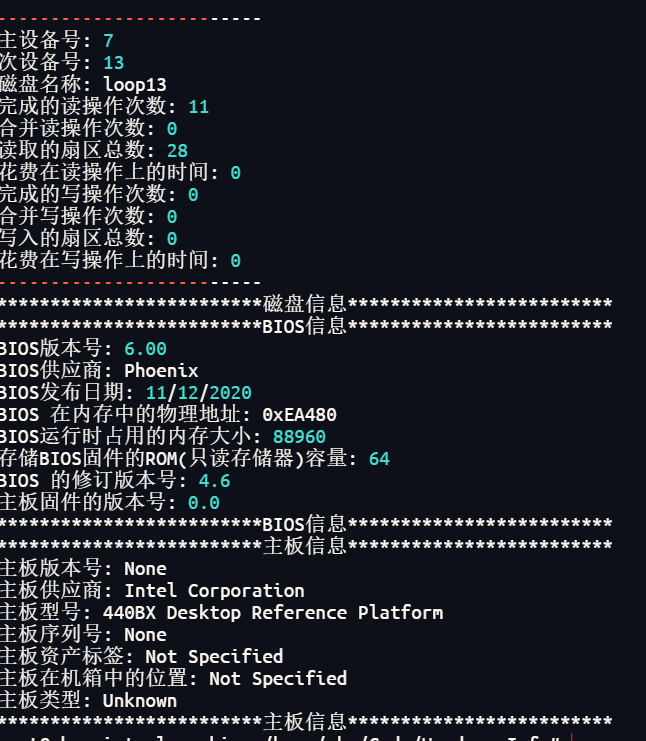

以上就是Linux下如何使用C++获取硬件信息的详细内容,更多关于C++获取硬件信息的资料请关注脚本之家其它相关文章!
